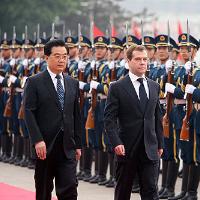When he joined Russian Prime Minister Vladimir Putin in St. Petersburg on Nov. 23, Chinese Premier Wen Jiabao reassuringly said that, "China will firmly follow the path of peaceful development and support the renaissance of Russia as a great power." Moscow policymakers, armed with nuclear weapons, probably have little fear of a war with China, but they can rightly be concerned about becoming a raw-material appendage to the growing Chinese economic giant.
Since Russia and China have settled their joint border and are not engaged in direct military competition with each other, the focus of the Russian-Chinese relationship in recent years has been on economic cooperation. This has seen considerable progress. China has now replaced Germany as Russia's top trading partner, while the PRC is now expected to become a leading purchaser of Russian energy. In a few weeks, Russia will begin supplying oil to China through a cross-border pipeline, which could eventually double the volume of Russian oil shipments to the PRC. Deliveries of natural gas and more coal, electricity, and nuclear power are also under consideration. But problems remain, especially due to the shifting terms of trade resulting from the rising capabilities of China's domestic industries, which can now make most of the goods that the PRC used to buy earlier from Russia.
In April 2009, the two governments finalized a $25 billion loan-for-oil deal. According to its provisions, the Development Bank of China lent Russia's state-run energy companies the money they needed to build and operate a 41-mile branch line extending from the Skovordino refinery on the East Siberia Pacific Ocean (ESPO) oil pipeline to the Russian-Chinese border town of Xing'an. The China National Petroleum Corp. (CNPC) has built a 620-mile pipeline from there to refineries in Daqing.

